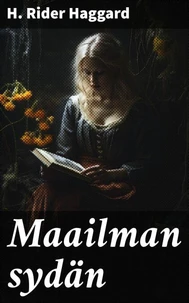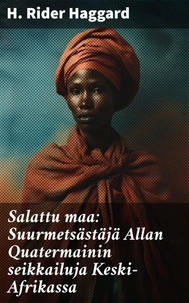Child of Storm. An Epic Adventure Through 19th Century African Wilderness and Colonial Conflicts
Par :Formats :
Disponible dans votre compte client Decitre ou Furet du Nord dès validation de votre commande. Le format ePub est :
- Compatible avec une lecture sur My Vivlio (smartphone, tablette, ordinateur)
- Compatible avec une lecture sur liseuses Vivlio
- Pour les liseuses autres que Vivlio, vous devez utiliser le logiciel Adobe Digital Edition. Non compatible avec la lecture sur les liseuses Kindle, Remarkable et Sony
 , qui est-ce ?
, qui est-ce ?Notre partenaire de plateforme de lecture numérique où vous retrouverez l'ensemble de vos ebooks gratuitement
Pour en savoir plus sur nos ebooks, consultez notre aide en ligne ici
- Nombre de pages216
- FormatePub
- ISBN859-65--4766613-4
- EAN8596547666134
- Date de parution22/08/2023
- Protection num.Digital Watermarking
- Taille580 Ko
- Infos supplémentairesepub
- ÉditeurGOOD PRESS
Résumé
In "Child of Storm, " H. Rider Haggard crafts a compelling narrative set against the backdrop of the turbulent Zulu territory during the late 19th century. The novel intricately weaves themes of adventure, colonialism, and personal growth, presenting a vivid portrayal of its protagonist, Allan Quatermain, as he navigates the complexities of life and death amid the tumult of both nature and human conflict.
Haggard's rich, descriptive prose and his ability to evoke the haunting beauty of the African landscape serve as a testament to the genre of adventure fiction, which gained prominence during the imperial era, reflecting contemporary attitudes towards exploration and otherness. Haggard, a pivotal figure in Victorian literature, drew from his own experiences in Africa as he penned "Child of Storm." Often influenced by his time as a colonial administrator and his fascination with ancient cultures, Haggard imbues the narrative with an authentic sense of place while interrogating the moral ambiguities of imperialist ideologies.
His vast understanding of indigenous cultures provides depth to the characters and enriches the storyline, making it not just an adventure tale but a commentary on cultural encounters. For readers seeking a captivating exploration of adventure intertwined with existential musings, "Child of Storm" is a must-read. Haggard'Äôs masterful storytelling offers not just enthralling action but also invites reflection on the consequences of colonial ambitions.
This novel, emblematic of its time, stands as a crucial literary piece that continues to resonate in discussions about colonialism and identity.
Haggard's rich, descriptive prose and his ability to evoke the haunting beauty of the African landscape serve as a testament to the genre of adventure fiction, which gained prominence during the imperial era, reflecting contemporary attitudes towards exploration and otherness. Haggard, a pivotal figure in Victorian literature, drew from his own experiences in Africa as he penned "Child of Storm." Often influenced by his time as a colonial administrator and his fascination with ancient cultures, Haggard imbues the narrative with an authentic sense of place while interrogating the moral ambiguities of imperialist ideologies.
His vast understanding of indigenous cultures provides depth to the characters and enriches the storyline, making it not just an adventure tale but a commentary on cultural encounters. For readers seeking a captivating exploration of adventure intertwined with existential musings, "Child of Storm" is a must-read. Haggard'Äôs masterful storytelling offers not just enthralling action but also invites reflection on the consequences of colonial ambitions.
This novel, emblematic of its time, stands as a crucial literary piece that continues to resonate in discussions about colonialism and identity.
In "Child of Storm, " H. Rider Haggard crafts a compelling narrative set against the backdrop of the turbulent Zulu territory during the late 19th century. The novel intricately weaves themes of adventure, colonialism, and personal growth, presenting a vivid portrayal of its protagonist, Allan Quatermain, as he navigates the complexities of life and death amid the tumult of both nature and human conflict.
Haggard's rich, descriptive prose and his ability to evoke the haunting beauty of the African landscape serve as a testament to the genre of adventure fiction, which gained prominence during the imperial era, reflecting contemporary attitudes towards exploration and otherness. Haggard, a pivotal figure in Victorian literature, drew from his own experiences in Africa as he penned "Child of Storm." Often influenced by his time as a colonial administrator and his fascination with ancient cultures, Haggard imbues the narrative with an authentic sense of place while interrogating the moral ambiguities of imperialist ideologies.
His vast understanding of indigenous cultures provides depth to the characters and enriches the storyline, making it not just an adventure tale but a commentary on cultural encounters. For readers seeking a captivating exploration of adventure intertwined with existential musings, "Child of Storm" is a must-read. Haggard'Äôs masterful storytelling offers not just enthralling action but also invites reflection on the consequences of colonial ambitions.
This novel, emblematic of its time, stands as a crucial literary piece that continues to resonate in discussions about colonialism and identity.
Haggard's rich, descriptive prose and his ability to evoke the haunting beauty of the African landscape serve as a testament to the genre of adventure fiction, which gained prominence during the imperial era, reflecting contemporary attitudes towards exploration and otherness. Haggard, a pivotal figure in Victorian literature, drew from his own experiences in Africa as he penned "Child of Storm." Often influenced by his time as a colonial administrator and his fascination with ancient cultures, Haggard imbues the narrative with an authentic sense of place while interrogating the moral ambiguities of imperialist ideologies.
His vast understanding of indigenous cultures provides depth to the characters and enriches the storyline, making it not just an adventure tale but a commentary on cultural encounters. For readers seeking a captivating exploration of adventure intertwined with existential musings, "Child of Storm" is a must-read. Haggard'Äôs masterful storytelling offers not just enthralling action but also invites reflection on the consequences of colonial ambitions.
This novel, emblematic of its time, stands as a crucial literary piece that continues to resonate in discussions about colonialism and identity.





